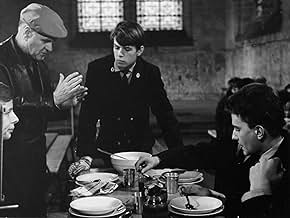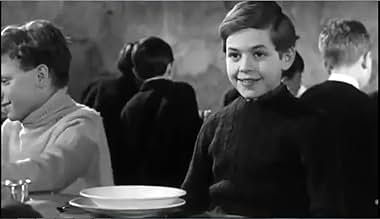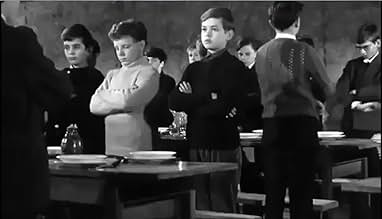IMDb रेटिंग
7.7/10
3.2 हज़ार
आपकी रेटिंग
अपनी भाषा में प्लॉट जोड़ेंA tale of the tender relationship between a 12-year-old boy and the upperclassman who is the object of his desire in the rigid atmosphere of their Jesuit-run school.A tale of the tender relationship between a 12-year-old boy and the upperclassman who is the object of his desire in the rigid atmosphere of their Jesuit-run school.A tale of the tender relationship between a 12-year-old boy and the upperclassman who is the object of his desire in the rigid atmosphere of their Jesuit-run school.
- निर्देशक
- लेखक
- स्टार
- पुरस्कार
- कुल 1 नामांकन
Gérard Chambre
- André Ferron
- (बिना क्रेडिट के)
Henri Coutet
- L'employé de l'institution
- (बिना क्रेडिट के)
Dominique Diamant
- Maurice Motier
- (बिना क्रेडिट के)
Alain-Philippe Malagnac
- Un élève
- (बिना क्रेडिट के)
Bernard Musson
- Le père enseignant
- (बिना क्रेडिट के)
Colette Régis
- La religieuse
- (बिना क्रेडिट के)
फ़ीचर्ड समीक्षाएं
I had read the novel (in English translation, one of two which have been published?) several years before seeing the film. It is, I think, characteristically French: carefully descriptive, observant, objective, restrained, but also subtly hypnotic. I read and read, and almost put the book down halfway through because it didn't seem to be going anywhere or making any impact on me. Then, all of a sudden, I was in tears-- but I still couldn't say exactly what had hit me other than everything. It was as though the pieces of a puzzle suddenly fell into place.
The film is faithful to the spirit as well as the letter of the book. Both were remarkably bold gestures for their time, describing an earlier generation and environment which were even more strait-laced. Like me, you may fall gently under its spell, then-- wham! Sheer magic.
The film is faithful to the spirit as well as the letter of the book. Both were remarkably bold gestures for their time, describing an earlier generation and environment which were even more strait-laced. Like me, you may fall gently under its spell, then-- wham! Sheer magic.
At first I did not think that the movie will be interesting. But I soon changed my opinion. The fact that the movie is in black and white makes it even more appealing than if it was in colour. The action takes place in a boarding school located in France. Actually the scenes from the dinning room reminded me of the movies for Harry Potter.
The main characters are Georges de Sarre 16 years old student and the young Alexandre (age 12) who is a student at the same school. Their friendship is really beautiful and heart touching. It sure brought some old memories too. There is a lot of poetry in this movie it seems that I am getting hocked to poetry- again! Few years ago there was a girl who was sending me sonnets of Shakespeare. I even tried to write some poems myself. I still haven't finished watching the movie it turned out to be on two CDs and I only got one of them, but will get the second one soon- then I will complete this review.
I have finished watching the movie and its ending made me sad sad and disgust. Disgust that there are such people who refuse to accept that a true, special friendship can exist and interfere to hurt everyone, but their pity selves. And do I know of such people because they are not only shown in the movies you know they lurk amongst us trying to make the rest believe and thing what they do such people really disgust me .
Les amitiés particulières is based on 1943 novel by French writer Roger Peyrefitte.
The main characters are Georges de Sarre 16 years old student and the young Alexandre (age 12) who is a student at the same school. Their friendship is really beautiful and heart touching. It sure brought some old memories too. There is a lot of poetry in this movie it seems that I am getting hocked to poetry- again! Few years ago there was a girl who was sending me sonnets of Shakespeare. I even tried to write some poems myself. I still haven't finished watching the movie it turned out to be on two CDs and I only got one of them, but will get the second one soon- then I will complete this review.
I have finished watching the movie and its ending made me sad sad and disgust. Disgust that there are such people who refuse to accept that a true, special friendship can exist and interfere to hurt everyone, but their pity selves. And do I know of such people because they are not only shown in the movies you know they lurk amongst us trying to make the rest believe and thing what they do such people really disgust me .
Les amitiés particulières is based on 1943 novel by French writer Roger Peyrefitte.
10ricbigi
I have long wished to see this film and finally a DVD of it has been made available, so I watched it with enormous curiosity. I must say I am very much touched by LES AMITIÉS PARTICULIÈRES, for everything rings absolutely true in this film. The screenplay by Jean Aurenche and Pierre Bost is perfection itself, rending Peyrefitte's autobiographical novel totally cinematic, visually striking and emotionally devastating. The acting by the two leading men is beyond anything I could have expected from such young performers. Didier Haudepin gives the best performance by a child actor I have ever seen in fifty-some years of film-going, standing alongside the likes of Patty Duke in THE MIRACLE WORKER, Brigitte Fossey in LES JEUX INTERDITS and Enzo Staiola in LADRI DI BICICLETTE. The supporting cast is equally to be praised, particularly the great Michel Bouquet. Frankly, Jean Delannoy deserves ample credit for having brought to the screen a film of such beauty and flawless artistry. I believe François Truffaut has never done anything that even approaches such a high level of film-making.
This is the film adaptation of Roger Peyrefitte's novel telling the deeply moving love story of brilliant 16 year-old aristocrat Georges de Sarre and beautiful 12 year-old Alexandre Motier at St. Claude's, a French, Catholic boarding-school in the 1920s. Though chaste, their love is passionately expressed through poems, gazes and the odd kiss, and there is no mistaking the sensuality underpinning it.
Whether consummated or not, for many centuries such intense love affairs between younger and older boys were a feature of boarding-school life that brought joy and relief to some of the more feeling and less hung-up sort of adolescents, as well as grief and catastrophe to the minority whose liaisons were discovered and crushed by the Christian authorities. They were essentially pederastic, satisfying different emotional needs in the younger and older participants, though the disparity in age lent them special intensity for both.
This ancient tradition more or less died a generation or so ago; the boys who would once have partaken or at least have approved of romantic friendships nowadays either never see their appeal, brought up as they are in a society so antagonistic to them, or shun them through terror of being misunderstood and branded as gay. Indeed, the number of reviews of this film implying gayness is proof they are right to fear it is now practically impossible to escape being judged according to the new dogma insisting on a fixed sexual orientation for even early teens.
It is salutary to remember that however responsible the priests at St. Claude's were for the tragedy of Alexandre and Georges and however misguided the abhorrence of sin that drove them to act as they did, they acted as gentle lambs compared to the savagery with which their post-Christian successors today would crush an affair that any older and younger boy had the temerity to get embroiled in. Our new moral dictators would of course destroy Alexandre to save him from an unequal relationship rather than from the sin of homosexuality, but that would make no difference to either the cruel outcome or the monstrous bigotry behind it. Ironically it would actually increase the perverse injustice of such interference: Alexandre is typical of the younger boy in a special friendship in that his emotional need for it is evidently greater and so it is even more vital to his happiness than to Georges's that it should not be broken up.
Considering special friendships at boarding-school seem to have disappeared from our emotional landscape and are now so badly misunderstood, we must be forever thankful that in the short space of time when they were still fairly widely understood and it had also become possible to write candidly about such delicate matters, not only did such a talented writer as Peyrefitte preserve their character for us so evocatively, but that a film was made of it before the moral panic about teenage sexuality which arose in the 80s made such an undertaking unthinkable.
Unsurprisingly, the film is not as outstanding as the novel, though mostly faithful to it. The most significant change is that, in the novel, Georges was only fourteen, but as he seemed a little improbably sophisticated for even a French patrician of that age, this was actually an improvement. The problem with the adaptation to film is largely the common one of condensation. Because we do not get to know the protagonists quite so well, it is harder to be so deeply moved by their plight. Mostly gone too is the richly elaborated conflict in the boys' minds between the influences of puritanical Christian doctrine and the boy-admiring Graeco-Roman attitudes it drove into hiding. Nevertheless, the film is well acted, atmospheric and near the end soars towards the heights of aching pathos achieved in the novel.
Peyrefitte was much involved in the making of the adaptation to film, which makes for a fascinating footnote: he was rewarded by meeting on the set the love of his life, 12-year-old Alain-Philippe Malagnac, who had a minor role in the film as a choirboy and introduced himself to the author as a fan of the novel, a story Peyrefitte recounted in Notre amour (1967).
Edmund Marlowe, author of Alexander's Choice, an Eton love story, www.amazon.com/dp/1481222112
Whether consummated or not, for many centuries such intense love affairs between younger and older boys were a feature of boarding-school life that brought joy and relief to some of the more feeling and less hung-up sort of adolescents, as well as grief and catastrophe to the minority whose liaisons were discovered and crushed by the Christian authorities. They were essentially pederastic, satisfying different emotional needs in the younger and older participants, though the disparity in age lent them special intensity for both.
This ancient tradition more or less died a generation or so ago; the boys who would once have partaken or at least have approved of romantic friendships nowadays either never see their appeal, brought up as they are in a society so antagonistic to them, or shun them through terror of being misunderstood and branded as gay. Indeed, the number of reviews of this film implying gayness is proof they are right to fear it is now practically impossible to escape being judged according to the new dogma insisting on a fixed sexual orientation for even early teens.
It is salutary to remember that however responsible the priests at St. Claude's were for the tragedy of Alexandre and Georges and however misguided the abhorrence of sin that drove them to act as they did, they acted as gentle lambs compared to the savagery with which their post-Christian successors today would crush an affair that any older and younger boy had the temerity to get embroiled in. Our new moral dictators would of course destroy Alexandre to save him from an unequal relationship rather than from the sin of homosexuality, but that would make no difference to either the cruel outcome or the monstrous bigotry behind it. Ironically it would actually increase the perverse injustice of such interference: Alexandre is typical of the younger boy in a special friendship in that his emotional need for it is evidently greater and so it is even more vital to his happiness than to Georges's that it should not be broken up.
Considering special friendships at boarding-school seem to have disappeared from our emotional landscape and are now so badly misunderstood, we must be forever thankful that in the short space of time when they were still fairly widely understood and it had also become possible to write candidly about such delicate matters, not only did such a talented writer as Peyrefitte preserve their character for us so evocatively, but that a film was made of it before the moral panic about teenage sexuality which arose in the 80s made such an undertaking unthinkable.
Unsurprisingly, the film is not as outstanding as the novel, though mostly faithful to it. The most significant change is that, in the novel, Georges was only fourteen, but as he seemed a little improbably sophisticated for even a French patrician of that age, this was actually an improvement. The problem with the adaptation to film is largely the common one of condensation. Because we do not get to know the protagonists quite so well, it is harder to be so deeply moved by their plight. Mostly gone too is the richly elaborated conflict in the boys' minds between the influences of puritanical Christian doctrine and the boy-admiring Graeco-Roman attitudes it drove into hiding. Nevertheless, the film is well acted, atmospheric and near the end soars towards the heights of aching pathos achieved in the novel.
Peyrefitte was much involved in the making of the adaptation to film, which makes for a fascinating footnote: he was rewarded by meeting on the set the love of his life, 12-year-old Alain-Philippe Malagnac, who had a minor role in the film as a choirboy and introduced himself to the author as a fan of the novel, a story Peyrefitte recounted in Notre amour (1967).
Edmund Marlowe, author of Alexander's Choice, an Eton love story, www.amazon.com/dp/1481222112
This Special Friendship was created in 1964 combining all the elements of a masterpiece. Born in the mind of Roger Peyrefitte, superbly adapted to the screen by Jean Delannoy, and exquisitely acted out by Francis LaCombrade and Didier Haudepin, this movie has become a timeless work of art. Set in France, in a religious Jesuit school, two boys, one sixteen, one twelve, intrigued by each other's company embark on a special friendship. This particular friendship which possesses all the unique qualities of genuine love and empathy is viewed as unholy by their priests who set about to destroy such a concept. The film is fashioned in black and white as were the rules of friendship in 1964. A classic, if ever there was one. Be prepared for some heart wrenching pathos. *****
क्या आपको पता है
- ट्रिवियाIn the source novel, Georges de Sarre is 14 years old and Alexandre Motier is 12 years old. However, the year in which the film was made, Francis Lacombrade (1942-) was 22 years old and Didier Haudepin (1951-) was 13 years old.
- गूफ़When Lucien looks at his watch we can see that the time is 6:15 but he reads it as 10:35.
टॉप पसंद
रेटिंग देने के लिए साइन-इन करें और वैयक्तिकृत सुझावों के लिए वॉचलिस्ट करें
- How long is This Special Friendship?Alexa द्वारा संचालित
विवरण
- रिलीज़ की तारीख़
- कंट्री ऑफ़ ओरिजिन
- भाषा
- इस रूप में भी जाना जाता है
- This Special Friendship
- फ़िल्माने की जगहें
- Abbaye de Royaumont, Asnières-sur-Oise, Val d'Oise, फ़्रांस(jesuit college where the story takes place)
- उत्पादन कंपनियां
- IMDbPro पर और कंपनी क्रेडिट देखें
- चलने की अवधि1 घंटा 40 मिनट
- रंग
- ध्वनि मिश्रण
- पक्ष अनुपात
- 1.78 : 1
इस पेज में योगदान दें
किसी बदलाव का सुझाव दें या अनुपलब्ध कॉन्टेंट जोड़ें

टॉप गैप
By what name was Les amitiés particulières (1964) officially released in India in English?
जवाब




















